情态动词用法归纳教学提纲
- 格式:doc
- 大小:18.50 KB
- 文档页数:4
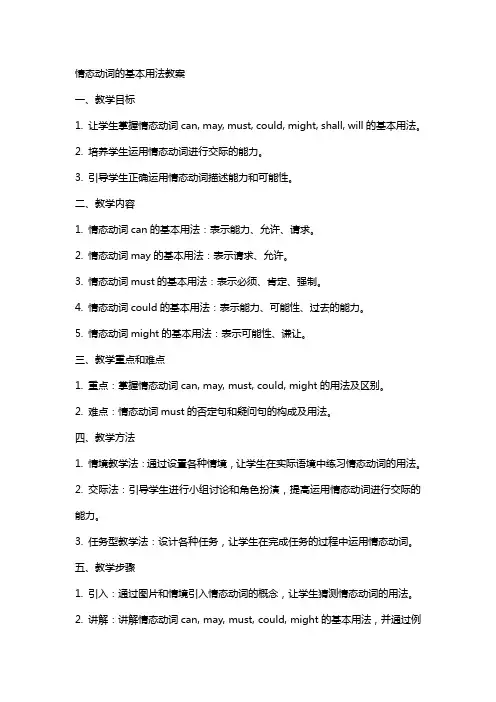
情态动词的基本用法教案一、教学目标1. 让学生掌握情态动词can, may, must, could, might, shall, will的基本用法。
2. 培养学生运用情态动词进行交际的能力。
3. 引导学生正确运用情态动词描述能力和可能性。
二、教学内容1. 情态动词can的基本用法:表示能力、允许、请求。
2. 情态动词may的基本用法:表示请求、允许。
3. 情态动词must的基本用法:表示必须、肯定、强制。
4. 情态动词could的基本用法:表示能力、可能性、过去的能力。
5. 情态动词might的基本用法:表示可能性、谦让。
三、教学重点和难点1. 重点:掌握情态动词can, may, must, could, might的用法及区别。
2. 难点:情态动词must的否定句和疑问句的构成及用法。
四、教学方法1. 情境教学法:通过设置各种情境,让学生在实际语境中练习情态动词的用法。
2. 交际法:引导学生进行小组讨论和角色扮演,提高运用情态动词进行交际的能力。
3. 任务型教学法:设计各种任务,让学生在完成任务的过程中运用情态动词。
五、教学步骤1. 引入:通过图片和情境引入情态动词的概念,让学生猜测情态动词的用法。
2. 讲解:讲解情态动词can, may, must, could, might的基本用法,并通过例句进行说明。
3. 练习:设计各种练习题,让学生区分情态动词的用法,如填空、选择、连词成句等。
4. 交际:组织小组讨论和角色扮演,让学生在实际语境中运用情态动词进行交际。
5. 任务:设计任务,如调查表、小作文等,让学生在完成任务的过程中运用情态动词。
6. 总结:对本节课的内容进行总结,强调情态动词的用法及区别。
7. 作业:布置作业,巩固所学内容,如练习题、观看相关视频等。
六、教学评估1. 课堂参与度:观察学生在课堂活动中的参与程度,了解他们对情态动词用法的掌握情况。
2. 练习完成情况:检查学生完成练习的情况,评估他们对情态动词用法的理解和应用能力。
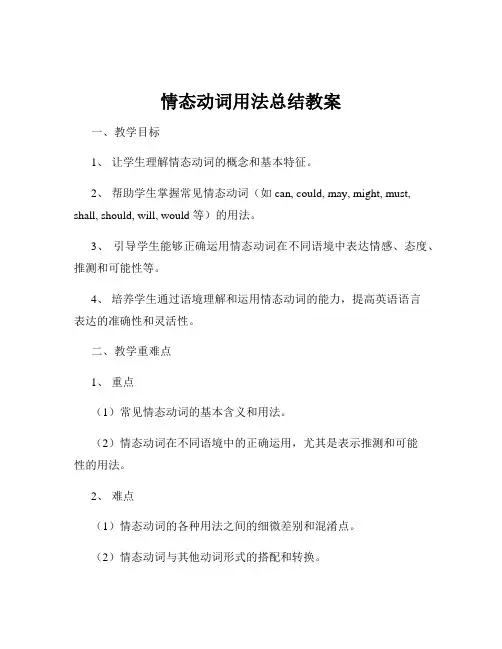
情态动词用法总结教案一、教学目标1、让学生理解情态动词的概念和基本特征。
2、帮助学生掌握常见情态动词(如 can, could, may, might, must, shall, should, will, would 等)的用法。
3、引导学生能够正确运用情态动词在不同语境中表达情感、态度、推测和可能性等。
4、培养学生通过语境理解和运用情态动词的能力,提高英语语言表达的准确性和灵活性。
二、教学重难点1、重点(1)常见情态动词的基本含义和用法。
(2)情态动词在不同语境中的正确运用,尤其是表示推测和可能性的用法。
2、难点(1)情态动词的各种用法之间的细微差别和混淆点。
(2)情态动词与其他动词形式的搭配和转换。
三、教学方法1、讲授法:讲解情态动词的基本概念、用法和特点。
2、举例法:通过大量的例句让学生直观地理解情态动词的用法。
3、练习法:安排各种形式的练习,如填空、选择、翻译等,让学生巩固所学知识。
4、讨论法:组织学生讨论一些有争议或容易混淆的情态动词用法,激发学生的思考和交流。
四、教学过程1、导入通过展示一些包含情态动词的句子,如“You can do it” “She must be very tired” 等,引导学生思考这些句子中情态动词的作用和含义,从而引出本节课的主题——情态动词的用法。
2、知识讲解(1)情态动词的定义和特点定义:情态动词是一类本身有一定的词义,表示说话人的情绪、态度或语气的动词,但不能单独作谓语,只能和其他动词原形一起构成谓语。
特点:没有人称和数的变化;后面接动词原形;具有多种含义,需要根据语境来理解。
(2)常见情态动词的用法can 和 could表示能力,can 表示现在的能力,could 表示过去的能力。
例如:“I can speak English” “He could swim when he was five”表示请求或允许,could 比 can 语气更委婉。
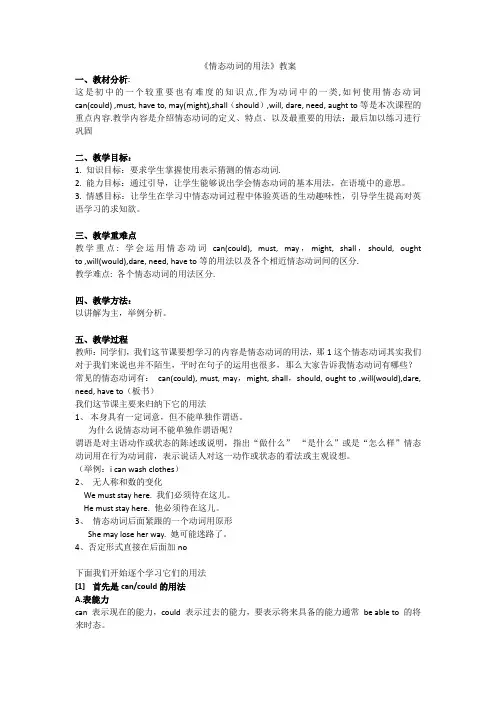
《情态动词的用法》教案一、教材分析:这是初中的一个较重要也有难度的知识点,作为动词中的一类,如何使用情态动词can(could) ,must, have to, may(might),shall(should),will, dare, need, aught to等是本次课程的重点内容.教学内容是介绍情态动词的定义、特点、以及最重要的用法;最后加以练习进行巩固二、教学目标:1. 知识目标:要求学生掌握使用表示猜测的情态动词.2. 能力目标:通过引导,让学生能够说出学会情态动词的基本用法,在语境中的意思。
3. 情感目标:让学生在学习中情态动词过程中体验英语的生动趣味性,引导学生提高对英语学习的求知欲。
三、教学重难点教学重点: 学会运用情态动词can(could), must, may,might, shall,should, ought to ,will(would),dare, need, have to等的用法以及各个相近情态动词间的区分.教学难点: 各个情态动词的用法区分.四、教学方法:以讲解为主,举例分析。
五、教学过程教师:同学们,我们这节课要想学习的内容是情态动词的用法,那1这个情态动词其实我们对于我们来说也并不陌生,平时在句子的运用也很多,那么大家告诉我情态动词有哪些?常见的情态动词有:can(could), must, may,might, shall,should, ought to ,will(would),dare, need, have to(板书)我们这节课主要来归纳下它的用法1、本身具有一定词意,但不能单独作谓语。
为什么说情态动词不能单独作谓语呢?谓语是对主语动作或状态的陈述或说明,指出“做什么”“是什么”或是“怎么样”情态动词用在行为动词前,表示说话人对这一动作或状态的看法或主观设想。
(举例:i can wash clothes)2、无人称和数的变化We must stay here. 我们必须待在这儿。
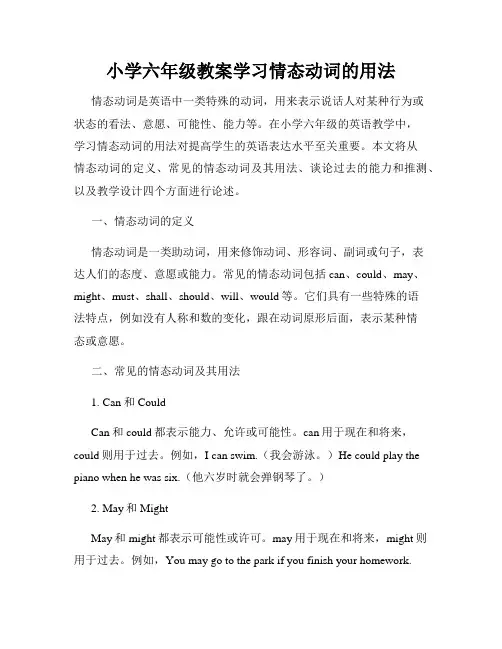
小学六年级教案学习情态动词的用法情态动词是英语中一类特殊的动词,用来表示说话人对某种行为或状态的看法、意愿、可能性、能力等。
在小学六年级的英语教学中,学习情态动词的用法对提高学生的英语表达水平至关重要。
本文将从情态动词的定义、常见的情态动词及其用法、谈论过去的能力和推测、以及教学设计四个方面进行论述。
一、情态动词的定义情态动词是一类助动词,用来修饰动词、形容词、副词或句子,表达人们的态度、意愿或能力。
常见的情态动词包括can、could、may、might、must、shall、should、will、would等。
它们具有一些特殊的语法特点,例如没有人称和数的变化,跟在动词原形后面,表示某种情态或意愿。
二、常见的情态动词及其用法1. Can和CouldCan和could都表示能力、允许或可能性。
can用于现在和将来,could则用于过去。
例如,I can swim.(我会游泳。
)He could play the piano when he was six.(他六岁时就会弹钢琴了。
)2. May和MightMay和might都表示可能性或许可。
may用于现在和将来,might则用于过去。
例如,You may go to the park if you finish your homework.(如果你完成作业的话,你可以去公园。
)She might be late for the meeting.(她可能会迟到会议。
)3. MustMust表示肯定性的推测、必要性或义务。
例如,The weather is so hot. It must be summer.(天气这么热,一定是夏天了。
)You mustfinish your homework before going to play.(你必须先做完作业再去玩。
)4. Shall和ShouldShall和should都表示建议、劝告或征求意见。
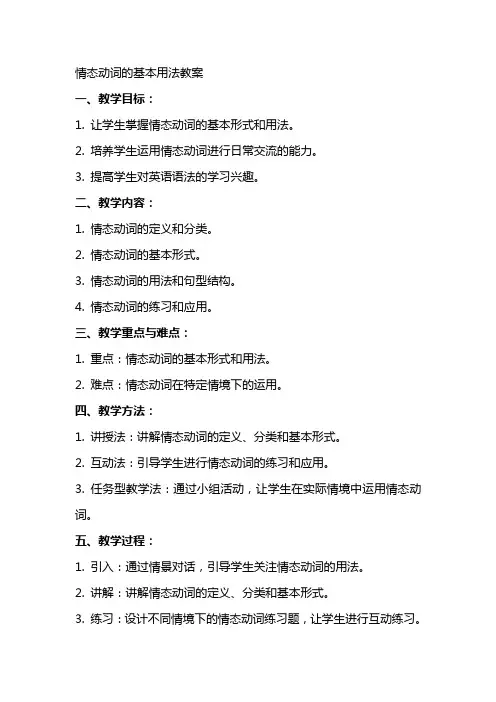
情态动词的基本用法教案一、教学目标:1. 让学生掌握情态动词的基本形式和用法。
2. 培养学生运用情态动词进行日常交流的能力。
3. 提高学生对英语语法的学习兴趣。
二、教学内容:1. 情态动词的定义和分类。
2. 情态动词的基本形式。
3. 情态动词的用法和句型结构。
4. 情态动词的练习和应用。
三、教学重点与难点:1. 重点:情态动词的基本形式和用法。
2. 难点:情态动词在特定情境下的运用。
四、教学方法:1. 讲授法:讲解情态动词的定义、分类和基本形式。
2. 互动法:引导学生进行情态动词的练习和应用。
3. 任务型教学法:通过小组活动,让学生在实际情境中运用情态动词。
五、教学过程:1. 引入:通过情景对话,引导学生关注情态动词的用法。
2. 讲解:讲解情态动词的定义、分类和基本形式。
3. 练习:设计不同情境下的情态动词练习题,让学生进行互动练习。
4. 应用:分组进行角色扮演,运用情态动词进行对话。
5. 总结:对本节课的内容进行总结,强调情态动词的用法。
教学评价:1. 课堂参与度:观察学生在课堂上的积极参与情况和提问回答。
2. 练习正确率:检查学生在练习中的正确率,及时给予反馈。
3. 对话表演:评价学生在角色扮演中的语言表达和运用情态动词的能力。
六、教学准备:1. 教学PPT:包含情态动词的基本形式和用法。
2. 练习题:设计不同情境下的情态动词练习题。
3. 角色扮演卡:提供不同角色和情境的卡片。
4. 教学录音机:用于播放情景对话。
七、教学步骤:1. 复习:复习上节课学习的情态动词的基本形式和用法。
2. 练习:让学生完成练习题,巩固情态动词的知识。
3. 情景对话:播放一段含有情态动词的情景对话,让学生跟读并理解。
4. 角色扮演:学生分组进行角色扮演,运用情态动词进行对话。
5. 小组讨论:让学生分组讨论情态动词在实际生活中的应用。
八、课堂活动:1. 游戏:设计一个情态动词的游戏,让学生在游戏中巩固知识。
2. 竞赛:组织一个情态动词知识竞赛,激发学生的学习兴趣。
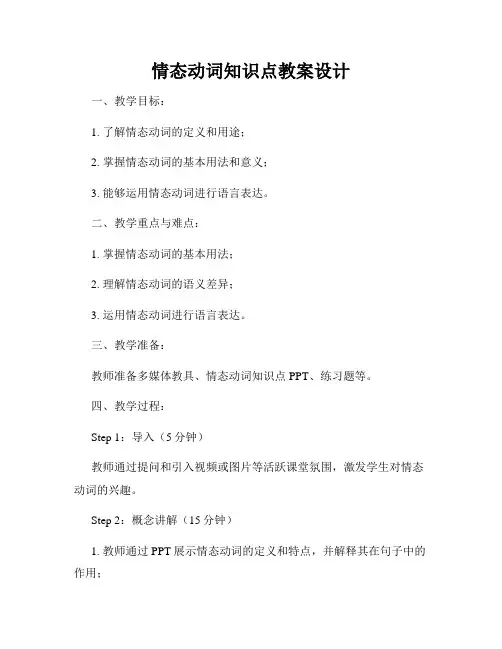
情态动词知识点教案设计一、教学目标:1. 了解情态动词的定义和用途;2. 掌握情态动词的基本用法和意义;3. 能够运用情态动词进行语言表达。
二、教学重点与难点:1. 掌握情态动词的基本用法;2. 理解情态动词的语义差异;3. 运用情态动词进行语言表达。
三、教学准备:教师准备多媒体教具、情态动词知识点PPT、练习题等。
四、教学过程:Step 1:导入(5分钟)教师通过提问和引入视频或图片等活跃课堂氛围,激发学生对情态动词的兴趣。
Step 2:概念讲解(15分钟)1. 教师通过PPT展示情态动词的定义和特点,并解释其在句子中的作用;2. 介绍常见的情态动词有can, could, may, might, will, would, shall, should, must等;3. 引导学生理解情态动词的语义,如表示能力、允许、可能性、推测、意愿、建议、命令等。
Step 3:用法解析(20分钟)1. 教师通过PPT详细讲解情态动词的基本用法,包括肯定句、否定句、疑问句以及其它常用句型;2. 强调情态动词在句子中的位置和变化规律;3. 通过例句和练习题让学生进行互动讨论,加深理解。
Step 4:情态动词间的区别(15分钟)1. 教师列举常见的情态动词,并比较它们的不同用法和意义;2. 强调should的建议、can的能力、must的必需、may的可能性等;3. 让学生进行小组对话或问答练习,加深理解情态动词的语义差异。
Step 5:情景对话(20分钟)1. 教师设计情景对话,让学生运用情态动词进行表达;2. 学生分角色进行对话练习,模拟真实情境;3. 教师适时提供反馈和指导,纠正学生的错误,并鼓励学生积极表达。
Step 6:巩固练习(15分钟)教师分发练习题,让学生独立完成,然后进行讲评,强化对情态动词的掌握程度。
Step 7:拓展延伸(5分钟)教师提供情景讨论或写作活动,让学生运用情态动词进行表达。
五、教学反思:通过本节课的情态动词知识点教案设计,利用多媒体和互动教学方式,激发学生对情态动词的兴趣,帮助学生理解情态动词的基本概念、用法和语义差异,并通过情景对话和练习题的训练,提高学生的语言表达能力。
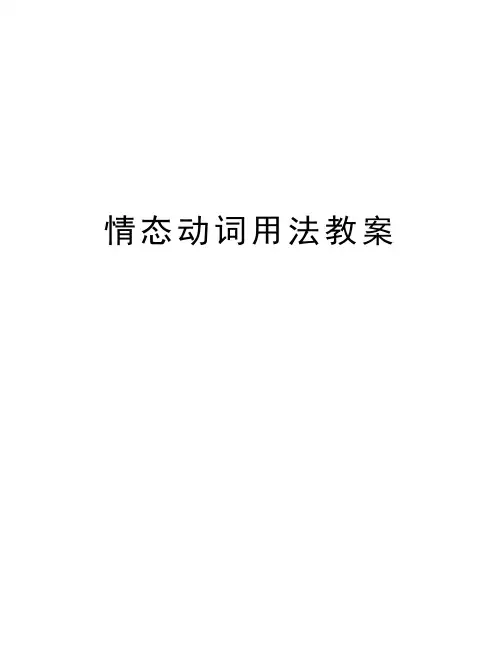
情态动词用法教案一、教学内容:情态动词二、教学目标:1、掌握情态动词的基本用法2、掌握情态动词辨析三、教学重难点:1、从整体上把握情态动词的语法和语义特征2、掌握每个情态动词在实际语境中的用法特点及功能四、教学过程(一)情态动词的基本用法1、情态动词的类型和特征2、情态动词的用法(1)can/could的用法✩以can开头的一般疑问句,其肯定与否定回答分别用can和can’t. (2)may/might的用法✩can 和may都可用来表征求意见或许可,意为“可以“,一般可互换。
(3)must的用法表示“可能不“,而can’t表示”不可能“。
在否定句中,mustn’t表示禁止,”不允许“。
(4)need 和dare的用法二者既可作情态动词也可作实义动词(5)shall(should),will(would)的用法(6)题组练习✩Don’t drive too fast, or you ___have a accident.✩May I park my car here?No, you ___.You should park the car in the car park.✩What a nice day! ___we go surfing?Good idea.✩You ___worry about him. He is old enough to look after himself.✩There is a book on the ground. It ___be John’s. Look! His photo is in it.✩ A teacher ___also make a mistake if he is not careful enough.✩Let’s go dancing tonigh.Sorry, I ___. I have to go to a meeting.答案:may/mustn’t/Shall/needn’t(don’t have to)/must/may/can’t(二)情态动词辨析1、can和be able to的区别can和be able to表示能力时用法同,can只用于一般现在时和一般过去时(could),其他时态要用be able to.另外,表示过去某一特定情况下成功做到某事,用be able to.Jim couldn’t speak Chinese last year, but now he can.我们下周能回来。
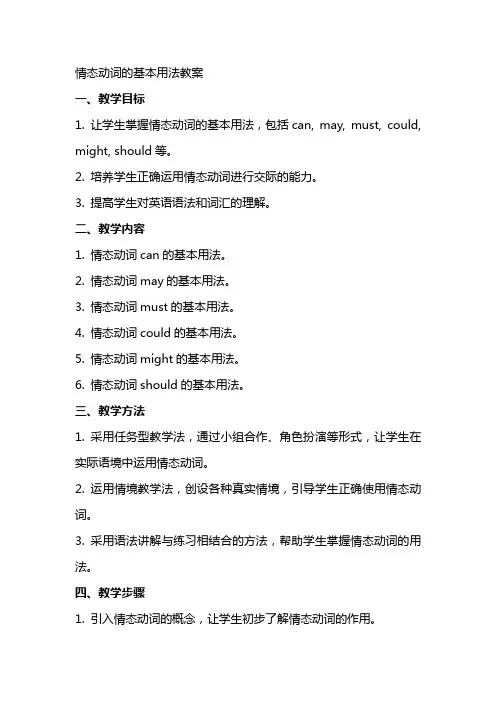
情态动词的基本用法教案一、教学目标1. 让学生掌握情态动词的基本用法,包括can, may, must, could, might, should等。
2. 培养学生正确运用情态动词进行交际的能力。
3. 提高学生对英语语法和词汇的理解。
二、教学内容1. 情态动词can的基本用法。
2. 情态动词may的基本用法。
3. 情态动词must的基本用法。
4. 情态动词could的基本用法。
5. 情态动词might的基本用法。
6. 情态动词should的基本用法。
三、教学方法1. 采用任务型教学法,通过小组合作、角色扮演等形式,让学生在实际语境中运用情态动词。
2. 运用情境教学法,创设各种真实情境,引导学生正确使用情态动词。
3. 采用语法讲解与练习相结合的方法,帮助学生掌握情态动词的用法。
四、教学步骤1. 引入情态动词的概念,让学生初步了解情态动词的作用。
2. 讲解情态动词can的用法,并通过例句和练习让学生加以巩固。
3. 讲解情态动词may的用法,并与can进行对比,让学生区分它们的用法。
4. 讲解情态动词must的用法,特别强调其表示推测和强制性的特点。
5. 讲解情态动词could的用法,并与may进行对比,让学生了解它们的区别。
五、作业与评价1. 作业:让学生运用所学的情态动词完成一个简短的故事或对话。
2. 评价:通过课堂表现、作业完成情况和小组合作等形式,对学生的学习效果进行评价。
教学反思:在教学过程中,要注意关注学生的学习情况,及时解答他们的疑问。
针对不同学生的学习水平,可以适当调整教学内容和难度。
通过多样化的教学活动,激发学生的学习兴趣,提高他们的参与度。
在评价环节,要注重学生的全面发展,既要关注他们的语法知识,也要关注他们的交际能力。
六、教学内容1. 情态动词should的用法,包括其表示建议、责任和建议的用法。
2. 情态动词need的用法,区分其作为情态动词和实义动词的不同用法。
3. 情态动词have to的用法,强调其表示必要性和被迫性的特点。
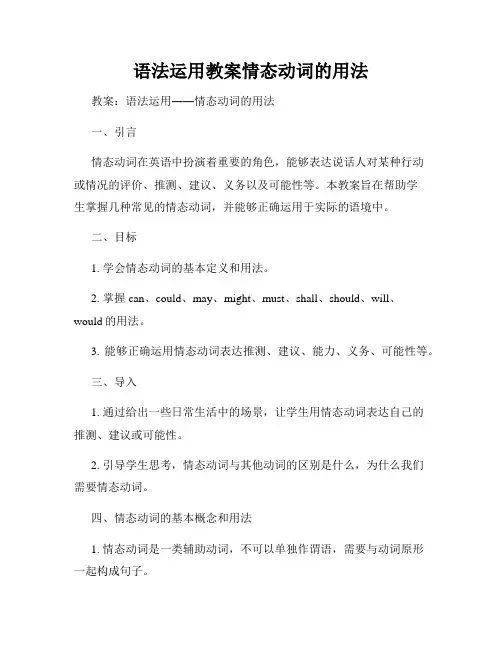
语法运用教案情态动词的用法教案:语法运用――情态动词的用法一、引言情态动词在英语中扮演着重要的角色,能够表达说话人对某种行动或情况的评价、推测、建议、义务以及可能性等。
本教案旨在帮助学生掌握几种常见的情态动词,并能够正确运用于实际的语境中。
二、目标1. 学会情态动词的基本定义和用法。
2. 掌握can、could、may、might、must、shall、should、will、would的用法。
3. 能够正确运用情态动词表达推测、建议、能力、义务、可能性等。
三、导入1. 通过给出一些日常生活中的场景,让学生用情态动词表达自己的推测、建议或可能性。
2. 引导学生思考,情态动词与其他动词的区别是什么,为什么我们需要情态动词。
四、情态动词的基本概念和用法1. 情态动词是一类辅助动词,不可以单独作谓语,需要与动词原形一起构成句子。
2. 情态动词可以表示说话人对某种行动或情况的态度、推测、建议、能力、义务或可能性。
3. 情态动词不具有人称和数的变化。
4. 情态动词后接动词原形,且不需要加to。
五、各种情态动词的用法1. Can/Coulda. 表示能力或可能性。
- She can swim. (她会游泳。
)- Could you help me with this problem? (你可以帮我解决这个问题吗?)b. 表示请求或邀请。
- Can you give me a hand? (你能帮个忙吗?)- Could you join us for dinner? (你能和我们一起吃饭吗?)2. May/Mighta. 表示推测或可能性。
- It may rain later. (今天可能会下雨。
)- He might be at home. (他可能在家。
)b. 表示请求或允许。
- May I borrow your pen? (我能借用你的钢笔吗?)- You may go now. (你可以走了。
)3. Musta. 表示推测或确定。
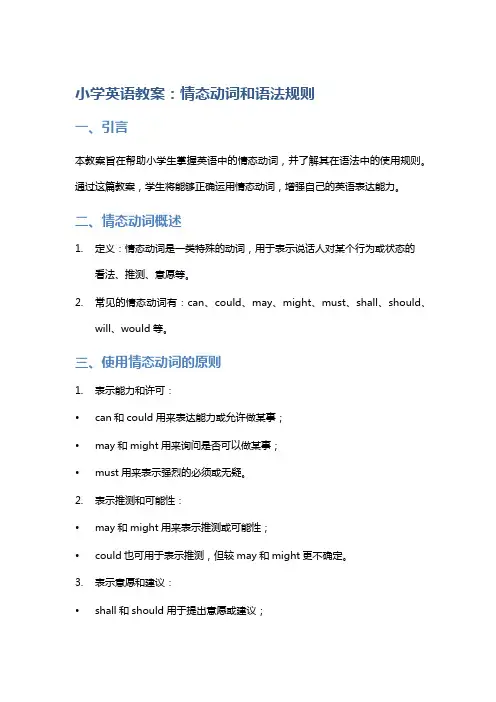
小学英语教案:情态动词和语法规则一、引言本教案旨在帮助小学生掌握英语中的情态动词,并了解其在语法中的使用规则。
通过这篇教案,学生将能够正确运用情态动词,增强自己的英语表达能力。
二、情态动词概述1.定义:情态动词是一类特殊的动词,用于表示说话人对某个行为或状态的看法、推测、意愿等。
2.常见的情态动词有:can、could、may、might、must、shall、should、will、would等。
三、使用情态动词的原则1.表示能力和许可:•can和could用来表达能力或允许做某事;•may和might用来询问是否可以做某事;•must用来表示强烈的必须或无疑。
2.表示推测和可能性:•may和might用来表示推测或可能性;•could也可用于表示推测,但较may和might更不确定。
3.表示意愿和建议:•shall和should用于提出意愿或建议;•will可以用于提出请求。
4.注意特殊用法:•would常常与if连用,表示假设条件;•must和can't用于表达对现在或过去情况的推测。
四、练习与活动1.给出一些场景,学生需要使用适当的情态动词来回答问题或表达意愿。
2.让学生编写对话,其中包含不同情态动词的运用,并进行角色扮演。
五、评价和总结通过本教案的学习,学生将能够正确理解和运用情态动词。
希望学生能够在实际英语交流中灵活运用所学知识,增强自信心。
以上就是关于小学英语教案:情态动词和语法规则的内容。
通过本教案,希望能帮助小学生掌握并巩固情态动词的知识,提升他们的英语水平。
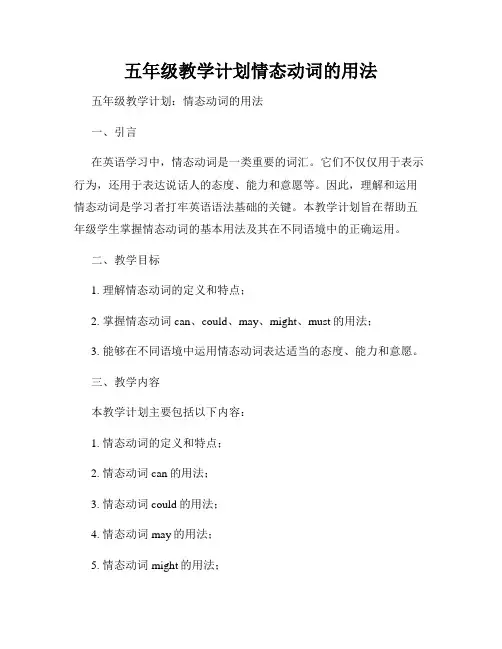
五年级教学计划情态动词的用法五年级教学计划:情态动词的用法一、引言在英语学习中,情态动词是一类重要的词汇。
它们不仅仅用于表示行为,还用于表达说话人的态度、能力和意愿等。
因此,理解和运用情态动词是学习者打牢英语语法基础的关键。
本教学计划旨在帮助五年级学生掌握情态动词的基本用法及其在不同语境中的正确运用。
二、教学目标1. 理解情态动词的定义和特点;2. 掌握情态动词can、could、may、might、must的用法;3. 能够在不同语境中运用情态动词表达适当的态度、能力和意愿。
三、教学内容本教学计划主要包括以下内容:1. 情态动词的定义和特点;2. 情态动词can的用法;3. 情态动词could的用法;4. 情态动词may的用法;5. 情态动词might的用法;6. 情态动词must的用法;7. 情态动词的否定形式和疑问形式;8. 情态动词在情景中的运用。
四、教学方法本教学计划采用多种教学方法,包括课堂讲解、示范、练习和游戏等。
通过多种形式的互动学习,激发学生的学习兴趣,提高学习效果。
五、教学步骤Step 1:引入情态动词通过介绍情态动词的定义和特点,让学生了解情态动词的作用和用法。
Step 2:学习情态动词can的用法课堂讲解can的用法,如表示能力、请求、允许等。
示范句子,引导学生进行语境理解及运用。
Step 3:学习情态动词could的用法课堂讲解could的用法,如表示过去的能力、礼貌的提问等。
示范句子,引导学生进行语境理解及运用。
Step 4:学习情态动词may的用法课堂讲解may的用法,如表示可能性、请求、询问允许等。
示范句子,引导学生进行语境理解及运用。
Step 5:学习情态动词might的用法课堂讲解might的用法,如表示较弱的可能性、委婉的请求等。
示范句子,引导学生进行语境理解及运用。
Step 6:学习情态动词must的用法课堂讲解must的用法,如表示肯定性、必须性等。
示范句子,引导学生进行语境理解及运用。
高中英语情态动词用法教案一、教学目标:1. 理解情态动词的基本概念和用法;2. 掌握情态动词的各种表达方式和用法;3. 能够正确运用情态动词进行语言表达。
二、教学重点:1. 情态动词的概念和特点;2. 情态动词的用法和表达方式。
三、教学难点:1. 情态动词的多样性用法;2. 情态动词与其他动词的区别。
四、教学准备:1. 教材:高中英语教材;2. 多媒体设备。
五、教学过程:步骤一:引入话题(5分钟)1. 引入情态动词的概念和作用,提醒学生情态动词在英语中的重要性;2. 引导学生思考情态动词的一些常见用法,如表示能力、推测、允许等。
步骤二:情态动词的基本概念(10分钟)1. 介绍情态动词的定义和特点;2. 通过例句和图示向学生展示情态动词的用法和表达方式;3. 强调情态动词与其他动词的区别。
步骤三:情态动词的表示能力(15分钟)1. 提供一些列情态动词的例句,要求学生根据上下文理解其表示的能力;2. 对学生进行小组讨论,展示他们对不同情态动词的理解和运用能力;3. 整理学生的回答,总结不同情态动词的表示能力。
步骤四:情态动词的推测和猜测(15分钟)1. 向学生展示一些情态动词的推测和猜测用法;2. 通过练习题目,让学生在实际运用中掌握情态动词的推测和猜测用法;3. 对学生答案进行讲解和解释,纠正他们的错误。
步骤五:情态动词的允许和建议(15分钟)1. 让学生了解情态动词在表示允许和建议方面的用法;2. 提供一些例句和对话进行讨论和练习;3. 强调情态动词在不同语境中的灵活运用。
步骤六:情态动词的其他用法(15分钟)1. 审视情态动词在禁止、可能性、请求等方面的用法;2. 鼓励学生通过阅读练习和交流理解情态动词在不同场合中的用法;3. 引导学生总结情态动词的主要用法和表达方式。
步骤七:情态动词的综合运用(15分钟)1. 提供综合性的情景对话,要求学生根据情境和所学内容进行表达;2. 分组演练,鼓励学生在小组内展示运用情态动词的能力;3. 对学生表现进行评价和指导,帮助他们改进和提高。
情态动词的用法说课尊敬的各位老师:大家好!今天我说课的内容是“情态动词的用法”。
下面我将从教材分析、学情分析、教学目标、教学重难点、教学方法、教学过程以及教学反思这几个方面来展开我的说课。
一、教材分析本节课所选用的教材是教材名称,情态动词是英语语法中的一个重要部分。
在本教材中,情态动词的内容分布在不同的章节,通过逐步深入的方式引导学生学习和掌握。
教材在编排上注重语法知识与实际语境的结合,通过丰富多样的例句和练习,帮助学生理解和运用情态动词。
同时,教材也提供了一些拓展性的阅读材料,让学生在阅读中进一步感受情态动词的用法。
二、学情分析我所授课的班级是具体班级,学生们经过之前的英语学习,已经具备了一定的词汇量和基本的语法知识。
然而,对于情态动词的理解和运用,学生们还存在一些困难和疑惑。
部分学生在学习情态动词时,容易混淆其用法,不能准确地根据语境选择合适的情态动词。
还有一些学生在运用情态动词进行表达时,缺乏灵活性和准确性。
但是,学生们对于英语学习有着较高的热情和积极性,愿意通过努力来提高自己的英语水平。
三、教学目标基于对教材和学情的分析,我制定了以下教学目标:1、知识目标学生能够掌握常见情态动词(如 can、could、may、might、must、should、ought to 等)的基本用法和意义。
2、能力目标学生能够在具体语境中正确使用情态动词进行表达,提高语言运用的准确性和灵活性。
3、情感目标培养学生学习英语语法的兴趣,增强学生学习英语的自信心。
四、教学重难点1、教学重点(1)常见情态动词的基本用法和意义。
(2)情态动词在不同语境中的运用。
2、教学难点(1)情态动词表示推测、可能性的用法。
(2)情态动词的否定形式和疑问形式的构成及用法。
五、教学方法为了实现教学目标,突破教学重难点,我将采用以下教学方法:1、讲授法通过讲解和示例,让学生了解情态动词的基本用法和规则。
2、练习法通过课堂练习和课后作业,让学生巩固所学的知识,提高运用能力。
情态动词的基本用法教案一、教学目标:1. 让学生掌握情态动词的基本用法,包括can, may, must, could, might, should等。
2. 培养学生正确运用情态动词进行表达的能力,能在实际情境中进行运用。
二、教学内容:1. 情态动词can的用法:表示能力、允许、请求等。
2. 情态动词may的用法:表示请求、允许、可能性等。
3. 情态动词must的用法:表示必须、肯定、推测等。
4. 情态动词could的用法:表示能力、请求、可能性等。
5. 情态动词might的用法:表示可能性、请求、谦让等。
6. 情态动词should的用法:表示应该、建议、责任等。
三、教学重点与难点:1. 重点:掌握情态动词的基本用法,能够正确运用。
2. 难点:区分情态动词的用法,以及在实际情境中正确选择使用。
四、教学方法:1. 情境教学法:通过设定各种情境,让学生在实际语境中学习情态动词的用法。
2. 互动教学法:引导学生进行小组讨论、角色扮演等互动活动,提高学生的参与度和积极性。
3. 任务型教学法:设计各种任务,让学生在完成任务的过程中运用情态动词。
五、教学步骤:1. 引入:通过图片或故事情境,引出情态动词的概念。
2. 讲解:讲解情态动词的基本用法,举例说明。
3. 练习:设计各种练习题,让学生进行巩固练习。
4. 互动活动:组织学生进行小组讨论、角色扮演等互动活动,运用情态动词。
5. 任务:设计实际任务,让学生在完成任务的过程中运用情态动词。
7. 作业布置:布置相关作业,让学生巩固所学知识。
六、教学评价:1. 课堂参与度:观察学生在课堂上的积极参与程度,包括发言、讨论、表演等。
2. 练习完成情况:检查学生完成练习的情况,包括答案的正确性和书写的规范性。
3. 任务完成情况:评价学生在完成任务过程中的表现,包括情态动词的运用准确性、沟通流畅性等。
4. 作业完成情况:审阅学生作业,评估情态动词用法的掌握程度。
5. 学生自评与互评:鼓励学生进行自我评价和同伴评价,以提高自我意识和团队协作能力。
《情态动词》的用法教案一、教学目标1. 让学生掌握情态动词的基本概念和用法。
2. 培养学生正确运用情态动词进行口语表达和写作。
3. 提高学生对英语语法和词汇的理解能力。
二、教学内容1. 情态动词的定义和分类。
2. 情态动词的肯定句、否定句和疑问句的构成及用法。
3. 常见情态动词的用法和搭配。
4. 情态动词在实际语境中的应用。
三、教学重点与难点1. 情态动词的分类和用法。
2. 情态动词的肯定句、否定句和疑问句的构成。
3. 情态动词的搭配和实际应用。
四、教学方法1. 讲授法:讲解情态动词的基本概念、分类和用法。
2. 互动法:引导学生进行情态动词的肯定句、否定句和疑问句的练习。
3. 情境教学法:通过设置实际语境,让学生运用情态动词进行口语表达和写作。
五、教学步骤1. 引入情态动词的概念,让学生初步了解情态动词的作用。
2. 讲解情态动词的分类,如can、may、must、should等,并举例说明其用法。
3. 引导学生学习情态动词的肯定句、否定句和疑问句的构成,进行相关练习。
4. 讲解情态动词的搭配,如“be able to”、“have to”等,并让学生进行实际运用。
5. 通过设置实际语境,让学生运用情态动词进行口语表达和写作,提高实际应用能力。
六、教学评估1. 课堂练习:设计一些关于情态动词的练习题,包括选择题、填空题和句子完成题,以巩固所学知识。
2. 小组讨论:让学生分组讨论情态动词在实际生活中的应用,选取小组代表进行分享。
3. 口语表达:组织学生进行情景对话,运用情态动词进行口语表达,评估学生的口语运用能力。
七、课后作业1. 让学生结合所学内容,编写一篇小作文,运用情态动词表达自己的观点和看法。
2. 完成课后练习册的相关题目,加深对情态动词用法的理解。
3. 搜集情态动词的实际应用例句,进行分享和交流。
八、拓展活动1. 举办情态动词知识竞赛,激发学生学习兴趣,巩固所学知识。
2. 组织学生进行情态动词的主题演讲,提高学生的口语表达能力和自信心。
情态动词有can (could), may (might), must, have to, sha ll (should, will (would), need (needed), ought to等。
情态动词无人称和数的变化;不能单独使用,必须与其后的动词原形构成谓语一、can, could(过去式)1) 表示能力(体力、知识、技能)。
Can you lift this heavy box?(体力)Mary can speak three languages.(知识)Can you skate?(技能)Can只有一般现在时和一般过去式;2) 表示请求和允许。
-----Can I go now?----- Yes, you can. / No, you can’t.3) 表示客观可能性(客观原因形成的能力)。
They’ve changed the timetable, so we can go by bus instead.This hall can hold 500 people at least.4) 表示推测(惊讶、怀疑、不相信的态度),用于疑问句、否定句和感叹句中。
Can this be true?This can’t be done by him.How can this be true?二、may, might1) 表示请求和允许。
might比may语气更委婉,而不是过去式。
否定回答时可用can’t或mustn’t,表示“不可以,禁止”。
----Might/ May I smoke in this room?---- No, you m ustn’t.---- May/Might I take this book out of the room?---- Yes, you can. (No, you can’t / mustn’t. )用May I...?征徇对方许可时比较正式和客气,而用Can I...?在口语中更常见。
情态动词的基本用法教案一、教学目标1. 让学生掌握情态动词can, may, must, could, might, should 的基本用法。
2. 培养学生运用情态动词进行日常交流的能力。
3. 提高学生对英语语法和词汇的理解。
二、教学内容1. 情态动词can 的用法:表示能力、允许、请求、可能性等。
2. 情态动词may 的用法:表示请求、允许、可能性等。
3. 情态动词must 的用法:表示肯定、必须、推测等。
4. 情态动词could 的用法:表示过去的能力、请求、可能性等。
5. 情态动词might 的用法:表示可能性、请求、谦让等。
6. 情态动词should 的用法:表示应该、建议、可能性等。
三、教学重点与难点1. 重点:掌握情态动词can, may, must, could, might, should 的基本用法。
2. 难点:区分情态动词之间的用法和搭配,以及在不同语境中的运用。
四、教学方法1. 任务型教学法:通过小组讨论、角色扮演等任务,让学生在实际语境中运用情态动词。
2. 情境教学法:创设各种真实的情境,让学生在实践中学会使用情态动词。
3. 互动式教学法:引导学生积极参与课堂活动,提高课堂氛围,增强学生的学习兴趣。
五、教学步骤1. 导入:以一段对话引入情态动词的概念,激发学生的学习兴趣。
2. 讲解:分别讲解情态动词can, may, must, could, might, should 的基本用法。
3. 练习:设计不同情境的练习题,让学生运用所学情态动词进行回答。
4. 小组讨论:让学生分组讨论情态动词在不同情境下的用法,分享学习心得。
5. 角色扮演:分组进行角色扮演,模拟真实场景,运用情态动词进行交流。
6. 总结:对本节课所学内容进行总结,强调情态动词的用法和搭配。
7. 作业:布置相关练习题,巩固所学知识。
六、教学评估1. 课堂练习:观察学生在练习中的表现,了解他们对于情态动词用法的掌握情况。
矿产资源开发利用方案编写内容要求及审查大纲
矿产资源开发利用方案编写内容要求及《矿产资源开发利用方案》审查大纲一、概述
㈠矿区位置、隶属关系和企业性质。
如为改扩建矿山, 应说明矿山现状、
特点及存在的主要问题。
㈡编制依据
(1简述项目前期工作进展情况及与有关方面对项目的意向性协议情况。
(2 列出开发利用方案编制所依据的主要基础性资料的名称。
如经储量管理部门认定的矿区地质勘探报告、选矿试验报告、加工利用试验报告、工程地质初评资料、矿区水文资料和供水资料等。
对改、扩建矿山应有生产实际资料, 如矿山总平面现状图、矿床开拓系统图、采场现状图和主要采选设备清单等。
二、矿产品需求现状和预测
㈠该矿产在国内需求情况和市场供应情况
1、矿产品现状及加工利用趋向。
2、国内近、远期的需求量及主要销向预测。
㈡产品价格分析
1、国内矿产品价格现状。
2、矿产品价格稳定性及变化趋势。
三、矿产资源概况
㈠矿区总体概况
1、矿区总体规划情况。
2、矿区矿产资源概况。
3、该设计与矿区总体开发的关系。
㈡该设计项目的资源概况
1、矿床地质及构造特征。
2、矿床开采技术条件及水文地质条件。